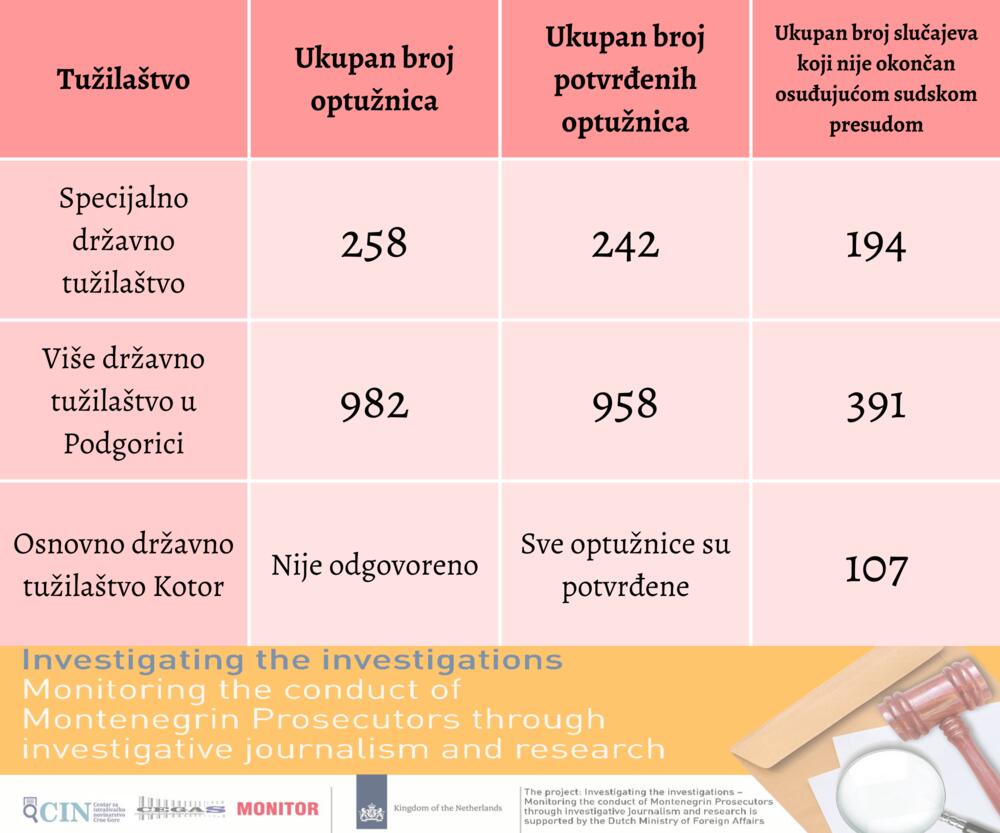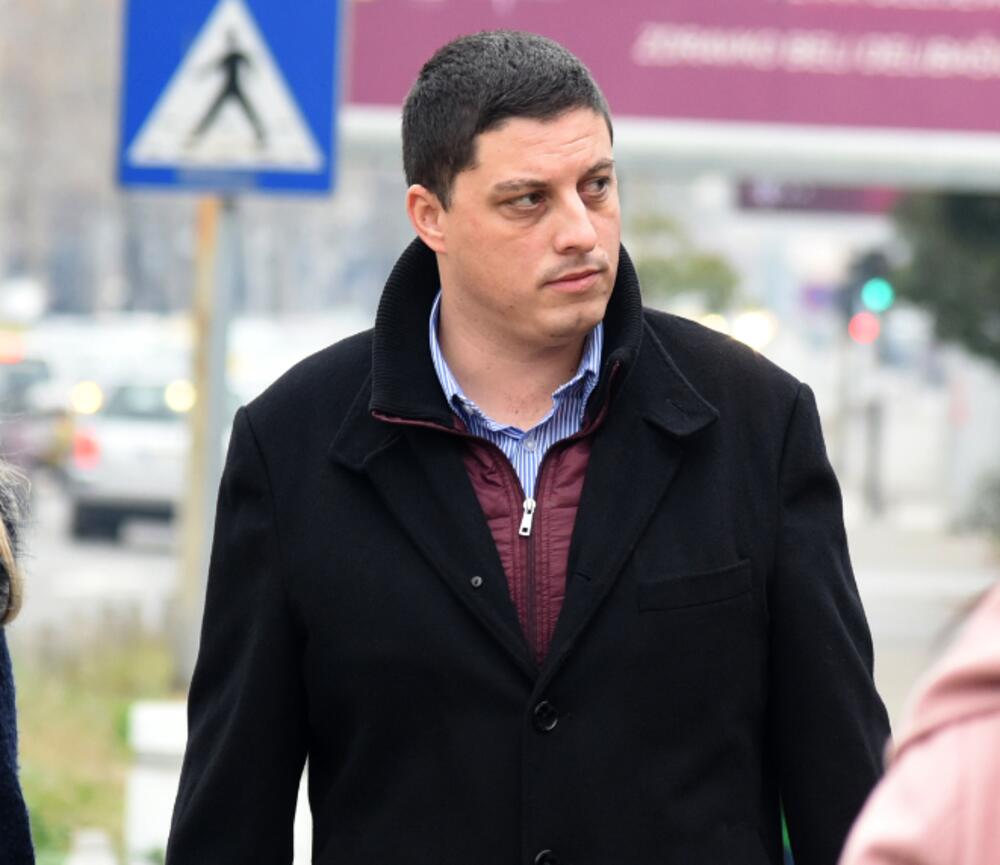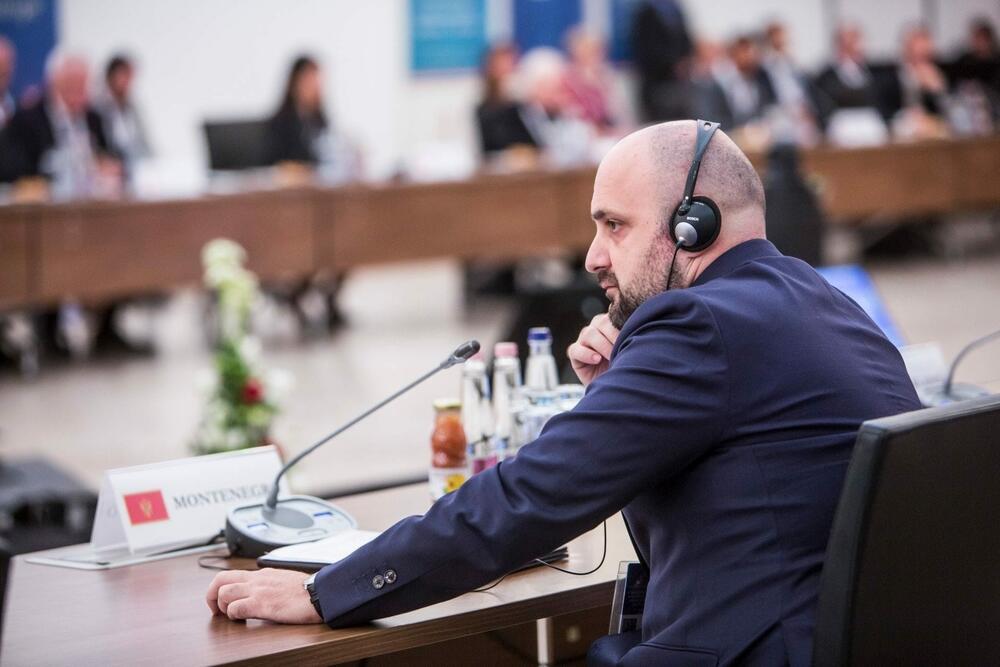Only a quarter of the indictments of the Special State Prosecutor's Office (SDT), in the last five and a half years, resulted in final convictions.
It is Center for Investigative Journalism of Montenegro (CIN-CG) and the Center for Civil Liberties (CEGAS) confirmed by the High Court in Podgorica.
According to the answers of that court, of the 258 indictments filed by the SDT, from 2016 to the middle of 2021, 242 of them were confirmed, but even 194 were not ended by a final conviction.
Chief Special Prosecutor (GST) Milivoje Katnic publicly, he does not miss the opportunity to brag about the number of indictments filed by that prosecution. It does not speak, however, about legally concluded proceedings before the court, where the SDT, bearing in mind these data, did not celebrate itself.
The situation is somewhat better with the indictments of the Higher State Prosecutor's Office (VDT), but this prosecution also managed to prove in court only slightly more than half of its indictments. Thus, out of 982 indictments brought by the VDT, in the last five and a half years, 958 of them were confirmed, but even 391 indictments were not ended by a final conviction.
The trouble is that often in very important proceedings, the quality of the accusations is problematic, and although formally confirmed, they fall in turn in adversarial proceedings before the court.
That's how some of the biggest cases of organized crime - proceedings against groups - ended in infamy before the court Duško Sarić and Safet Kalić, who were acquitted of money laundering from the sale of narcotics. Acquittals were also received by those accused of war crimes - deportation of refugees, accused of crimes in Bukovica, but also in Kaluđerski laz. The prosecutors who acted in the cases were not responsible for the omissions, and some of them even advanced in the service.
Even in the case of a group Svetozar Marović, which SDT often cites as a good example of the fight against corruption at the highest level, the main actors did not serve their sentence. Those accused of corruption and the creation of a criminal organization made an agreement with SDT, but Marović and his son did not even serve their sentence, part of which has already expired.
In addition, in one of the biggest cases led by Milivoje Katnić - proceedings for attempted terrorism on the day of the parliamentary elections in 2016, the first-instance conviction was annulled and the case returned for retrial. This case, which has not yet been legally concluded, attracted a lot of attention because the leaders of the Democratic Front (DF) are among the accused.

And while prosecutors have been calling for functional immunity in their work for years, experts believe that it is high time to start analyzing the quality of accusations, and seek, in addition to possible criminal, personal and disciplinary responsibility for low-quality work, which ultimately leads to a miscarriage of justice. huge consequences for the budget, but also stagnation on the way to the European Union (EU).
Only in the case of Kalić, the citizens of Montenegro, after the indictment was dropped, paid multimillion-dollar compensation.
In last year's report of the European Commission (EC), it is assessed that there is no progress in the field of justice, and that the implementation of key reforms is stagnating.
It is also emphasized that it is necessary to review the disciplinary and ethical responsibility of judges and prosecutors. CIN-CG previously announced that only one prosecutor in the last ten years was rated good, while all the others received the highest ratings.
Attorney Branislav Lutovac for CIN-CG, he points out that the biggest problem is precisely that the prosecution experienced a debacle in major cases of organized crime and corruption, and that the prosecutors who acted in those cases, due to inexperience and unfounded indictments, instead of bearing responsibility, progressed.
"The prosecutor's office is a completely closed organization and the statistics they refer to about confirmed indictments are irrelevant," Lutovac assessed.
He expects the new Prosecutor's Council (TS) to introduce relevant criteria and realistically assess the work of prosecutor's offices. "I believe that the new TS will work much better than this one so far," emphasized Lutovac.
The higher prosecutor's office refused to provide data on which crimes the indictments referred to that did not result in final convictions, but the fact that these two prosecutor's offices deal with the detection of the most serious crimes speaks volumes about their efficiency.
Despite several weeks of waiting, we did not receive an explanation from the High Court as to whether the data they provided us about the number of indictments by the SDT and the Podgorica VDT, which have not ended with a conviction, refer to completed or to proceedings that are still in progress. flow.

The SDT was formed in the middle of 2015 and deals with organized crime, high corruption, money laundering, terrorism, war crimes and crimes against electoral rights. SDT took over the work of the Department for the Suppression of Organized Crime, Corruption, Terrorism and War Crimes, which functioned under the Supreme State Prosecutor's Office.
The VDT is responsible for criminal offenses for which a prison sentence of over ten years is prescribed, namely murder, rape, endangering the safety of air traffic, unauthorized production, possession and placing on the market of narcotic drugs, calling for a violent change of the constitutional order, disclosure of secret information, inciting national, racial and religious hatred, discord and intolerance, violation of territorial sovereignty, association for unconstitutional activities, preparation of acts against the constitutional order and security of Montenegro and against humanity and other goods protected by international law.
The Higher State Prosecutor's Office in Bijelo Polje did not answer how many indictments they filed since 2016, but they did say that 18 indictments did not result in a final conviction. The indictments that fell before the court related to attempted murder, rape, unauthorized production, possession and distribution of narcotic drugs, participation in a fight and abuse of official position.
Most of the indictments of the basic prosecutor's offices "fell" in Kotor
When it comes to prosecutions at the local level, the Basic State Prosecutor's Office in Kotor (ODTK), according to the submitted data, had the largest number of indictments that fell before the court. Since 2016, as many as 107 indictments have not resulted in final convictions. However, the Kotor Prosecutor's Office, as well as other basic prosecutor's offices, did not submit data on the total number of indictments they filed in the last five years.
Most of the indictments filed by the Basic Prosecutor's Office in Kotor, which did not go through the court proceedings, relate to the criminal offenses of illegal possession of weapons and explosive substances, serious offenses against public traffic safety, serious bodily injury, violent behavior, serious theft and serious offenses against general safety. .
In the last five years, the basic court in Podgorica had 439 final convictions, while 67 of them were not ended in that way. Another 118 indictments from this period are pending in that court. They did not provide information about which criminal acts are involved when it comes to indictments that did not end with convictions.
In most of the other municipal prosecutor's offices, there were indictments that did not result in final convictions.
For the purposes of this research, we requested data from all prosecutor's offices in the country. Although the results are different, no prosecution has provided us with answers to all the questions.
Prosecutor's Offices do not provide data on the statute of limitations
All the prosecutor's offices we contacted refused to provide decisions on dismissed criminal charges due to the statute of limitations of prosecution in the last five years, with the explanation that they protect the privacy of the persons mentioned in them, although we clarified in telephone conversations that they should provide anonymized data.
SDT and VDT also refused to provide data on how many criminal charges have been dismissed due to the statute of limitations and to which crimes they relate, stating that it is a matter of creating new information and that the data that can be published can be found in the reports of the prosecutor's offices. However, there is no detailed information about this in the reports of the prosecutor's offices, which are available on the website. The only thing that can be concluded from the report is that more than 90 percent of criminal reports are dismissed precisely because of the statute of limitations. Why these data have been under the veil of secrecy for years, and whether the new Prosecutor's Council will also deal with this topic remains to be seen.
One of the most serious disciplinary offenses is when the prosecutor, without justifiable reason, does not act in cases within the deadlines prescribed by law, and as a result, the statute of limitations for criminal prosecution occurs. But because of this, no prosecutor in Montenegro has been held accountable for the time being.
Lawyer Lutovac points out that the fact that the information about the reasons that led to the statute of limitations, as well as who was accused in those proceedings, has been hidden from the public for years, definitely points to the suspicion that there was abuse of official duties.
Gazivoda: The new TS should also deal with the quality of prosecutors' work
Attorney Siniša Gazivoda, who was elected as a member of the new Prosecutor's Council, assesses for CIN-CG that the Council should also deal with issues of the quality of indictments and the work of prosecutors who act in problematic cases.
"It is an important topic that should be considered and whether there are any measures that should be taken in that direction," said Gazivoda.

The new TS, which was finally elected at the end of last year, should hold its first constitutive session on January 24, at which, according to the amendments to the Law on the State Prosecutor's Office, a new acting Supreme State Prosecutor's Office (acting Supreme State Prosecutor's Office) should be elected. At that session, the position on the eventual initiation of the process for Katnić's dismissal should also be crystallized.
Božović: Key problems for progress towards the EU
State Secretary in the Ministry of Justice Bojan Božović for CIN-CG, he assessed that the number of final conviction decisions should also speak for the quality of the prosecutors' work.

"The Ministry of Justice, Human and Minority Rights will, within the scope of its competences, but also through the presence of its member in the Prosecutor's Council, open issues of the quality of accusations, as well as the statute of limitations of criminal charges. These are, among other things, one of the key issues for future progress in Chapters 23 and 24," said Božović.
In addition, he adds, special attention will be devoted to the improvement of the procedure for determining the merits of complaints about the work of prosecutors, as well as to the improvement of the system of their evaluation and advancement.

Bonus video:




